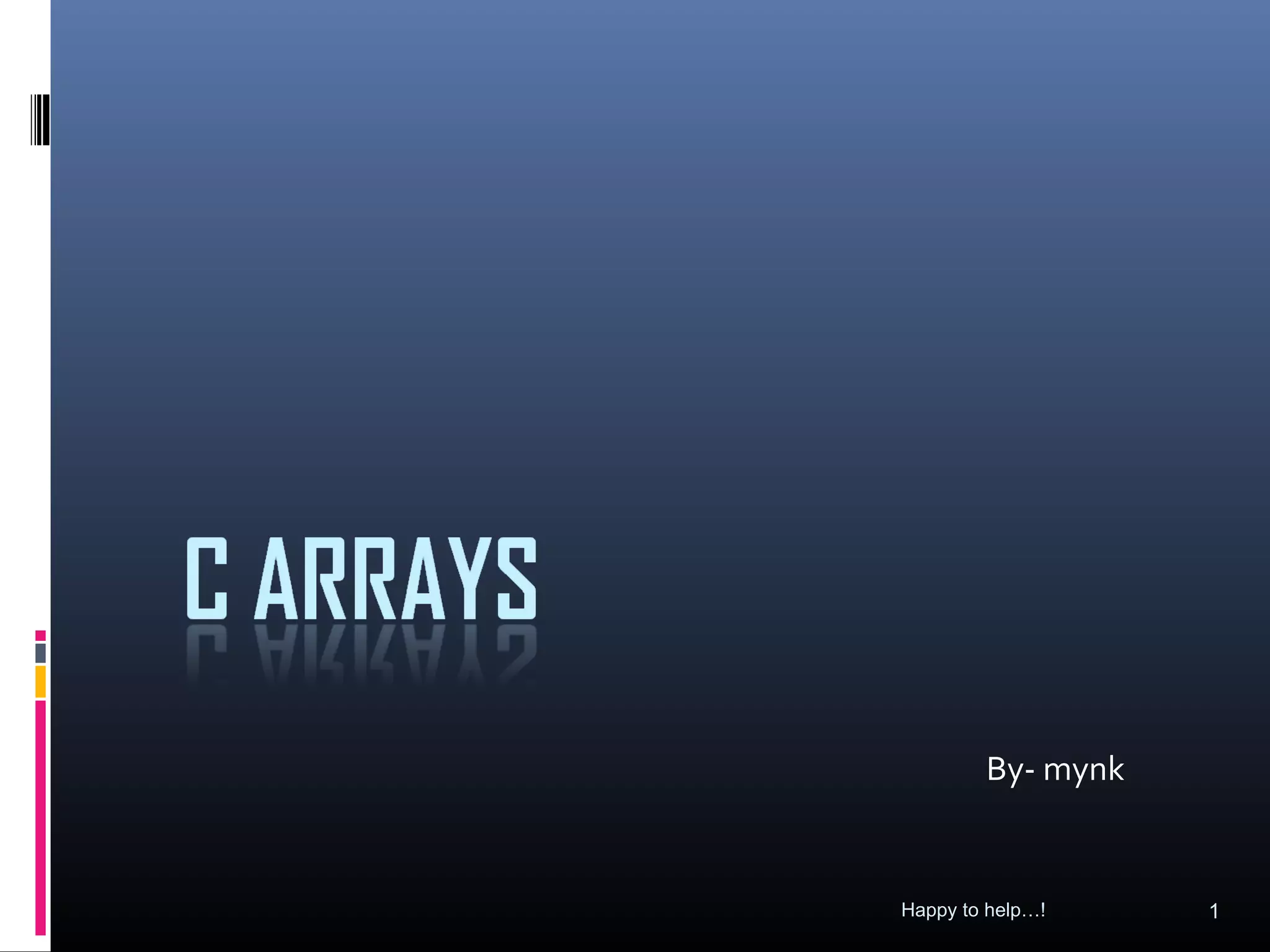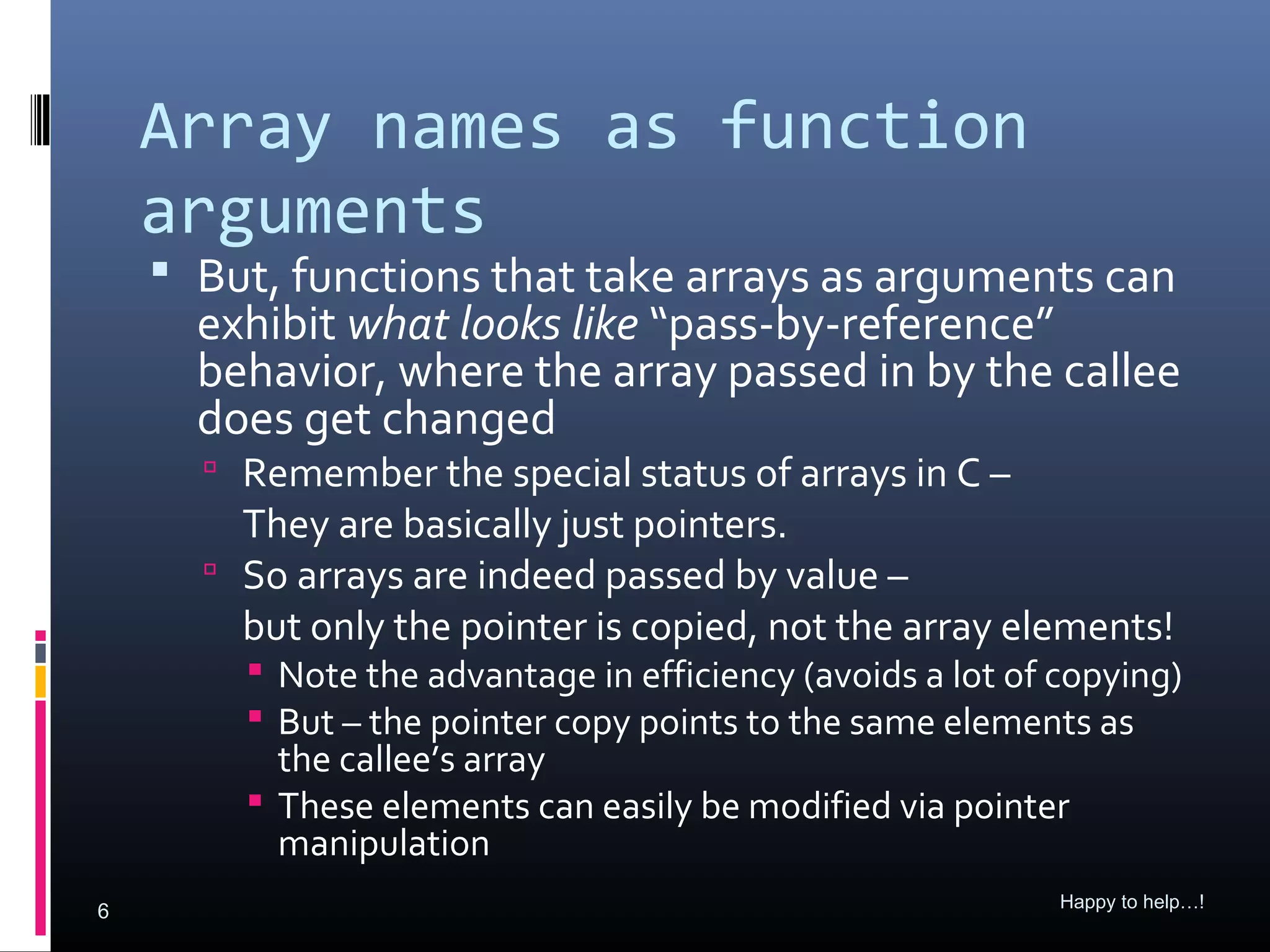1) Arrays in C are really pointers - an array name refers to the memory location of the first element. This means arrays can be passed by value like pointers while still allowing modification of elements.
2) Multidimensional arrays are arrays of arrays stored sequentially in memory in row-major order. Subscripting a multidimensional array involves pointer arithmetic using the sizes of each dimension.
3) When passing multidimensional arrays to functions, only the first dimension's size can be omitted as the other sizes are needed for pointer arithmetic on subscripts.

![Review of arrays
There are no array variables in C – only array
names
Each name refers to a constant pointer
Space for array elements is allocated at declaration
time
Can’t change where the array name refers to…
but you can change the array elements,
via pointer arithmetic
??? ??? ??? ???
(int []) (int) (int) (int) (int)
m
int m[4];
Happy to help…! 2](https://image.slidesharecdn.com/arrays1-ppt-130313025329-phpapp01/75/Array-2-2048.jpg)
![Subscripts and pointer
arithmetic
array[subscript] equivalent to *(array +
(subscript))
Strange but true: Given earlier declaration of m,
the expression 2[m] is legal!
Not only that: it’s equivalent to *(2+m)
*(m+2)
m[2]
Happy to help…! 3](https://image.slidesharecdn.com/arrays1-ppt-130313025329-phpapp01/75/Array-3-2048.jpg)
![Array names and pointer
variables, ??? ??? ???
playing together
int m[3];
subscript OK (int [])
(int) (int) (int)
with pointer variable m
(int [])
int *mid = m + 1; mid
(int [])
right
int *right = mid[1];
(int [])
left
int *left = mid[-1]; (int [])
compiler may not catch this – beyond
int *beyond = mid[2]; environment certainly won’t
runtime
Happy to help…! 4](https://image.slidesharecdn.com/arrays1-ppt-130313025329-phpapp01/75/Array-4-2048.jpg)
![Array names as function
arguments
In C, arguments are passed “by value”
A temporary copy of each argument is created, solely for use within
the function call
void f(int x, int *y) { … }
void g(…) { 17 42 17
int a = 17, b = 42; (int) (int) (int) (int [])
f(a, &b); a b x y
…
} g f
Pass-by-value is “safe” in that the function plays only in its
“sandbox” of temporary variables –
can’t alter the values of variables in the callee (except via the return
value)
Happy to help…! 5](https://image.slidesharecdn.com/arrays1-ppt-130313025329-phpapp01/75/Array-5-2048.jpg)

![Array names as function
arguments
The strcpy “string copy” function puts this
“pseudo” call-by-reference behavior to good
use
void strcpy(char *buffer, char const *string);
void f(…) {
char original[4] = ″dog″; g
d o NUL (char [])
(char [])
char copy[4]; (char) (char) (char) (char)
origin string
strcpy(copy, original);
al
} (char []) d
??? o
??? g
??? NUL
??? (char [])
(char) (char) (char) (char)
copy buffer
f strcpy
Happy to help…! 7](https://image.slidesharecdn.com/arrays1-ppt-130313025329-phpapp01/75/Array-7-2048.jpg)
![When can array size be
omitted?
There are a couple of contexts in which an array
declaration need not have a size specified:
Parameter declaration:
int strlen(char string[]);
As we’ve seen, the elements of the array argument are
not copied, so the function doesn’t need to know how
many elements there are.
Array initialization:
int vector[] = {1, 2, 3, 4, 5};
In this case, just enough space is allocated to fit all (five)
elements of the initializer list
Happy to help…! 8](https://image.slidesharecdn.com/arrays1-ppt-130313025329-phpapp01/75/Array-8-2048.jpg)
![Multidimensional arrays
How to interpret a declaration like:
int d[2][4];
This is an array with two elements:
Each element is an array of four int values
The elements are laid out sequentially in
memory, just like a one-dimensional array
Row-major order: the(int)
elements of the rightmost
(int)
(int) (int) (int) (int) (int) (int)
subscript are stored contiguously
d[0][1] d[1][2] d[1][3]
d[0][0] d[0][2] d[0][3] d[1][0] d[1][1]
d[0] d[1]
Happy to help…! 9](https://image.slidesharecdn.com/arrays1-ppt-130313025329-phpapp01/75/Array-9-2048.jpg)
![Subscripting in a
multidimensional array
int d[2][4];
*(d+1) [1]
*(*(d+1)+2) [2]
d Then increment by the
size of 2 ints
Increment by the size of
1 array of 4 ints
(int) (int) (int) (int) (int) (int) (int) (int)
d[0][0] d[0][1] d[0][2] d[0][3] d[1][0] d[1][1] d[1][2] d[1][3]
d[0] d[1]
Happy to help…! 10](https://image.slidesharecdn.com/arrays1-ppt-130313025329-phpapp01/75/Array-10-2048.jpg)
![Why do we care about
storage order?
If you keep within the “paradigm” of the
multidimensional array, the order doesn’t
matter…
But if you use tricks with pointer arithmetic,
it matters a lot 0 1 2 3
It also matters for initialization 4 5 6 7
To initialize d like this:
use this:
int d[2][4] = {0, 1, 2, 3, 4, 5, 6, 7};
rather than this
int d[2][4] = {0, 4, 1, 5, 2, 6, 3, 7};
Happy to help…!
11](https://image.slidesharecdn.com/arrays1-ppt-130313025329-phpapp01/75/Array-11-2048.jpg)
![Multidimensional arrays as
parameters
Only the first subscript may be left unspecified
void f(int matrix[][10]); /* OK */
void g(int (*matrix)[10]); /* OK */
void h(int matrix[][]); /* not OK */
Why?
Because the other sizes are needed for scaling when
evaluating subscript expressions (see slide 10)
This points out an important drawback to C:
Arrays do not carry information about their own sizes!
If array size is needed, you must supply it somehow
(e.g., when passing an array argument, you often have
to pass an additional “array size” argument) – bummer
Happy to help…! 12](https://image.slidesharecdn.com/arrays1-ppt-130313025329-phpapp01/75/Array-12-2048.jpg)